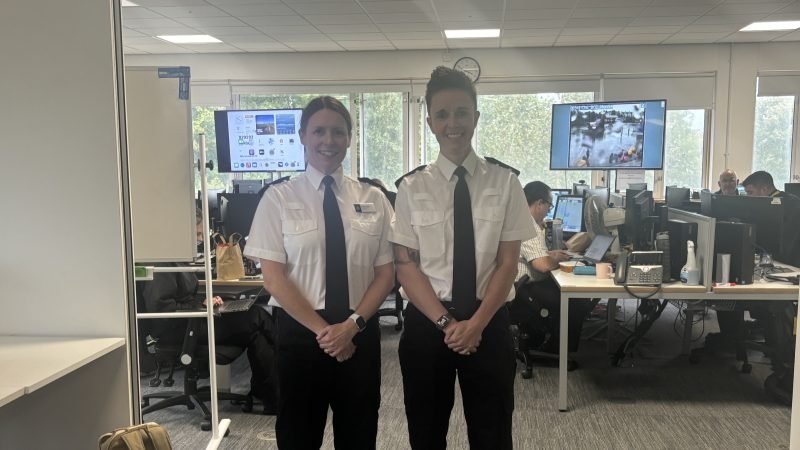Cupcakes, cookies and pain au chocolat were some of the many snacks on offer at Avon & Somerset Police headquarters on Sunday afternoon.
This food served as fuel for the silver command suite, a room full of representatives from the police, the ambulance service, the fire service, the city council and World Rugby, all working together to ensure the England v Scotland Women’s Rugby World Cup quarter-final went off without a hitch at Ashton Gate Stadium.
It is unlikely such a big team would have been assembled for the 2010 Women’s Rugby World Cup, the last time the tournament was hosted in England.
Independent journalism
is needed now More than ever
Keep our city’s journalism independent. Become a supporter member today.
The fact so many people were in the room, and policing plans started being developed for these matches in January, reflects how popular the women’s game has become in the last decade.
“The reality is, the opening game in Sunderland had near enough the same amount of ticket sales as the entire previous tournament had,” Avon & Somerset Police superintendent Vicks Hayward-Melen said.
Assistant chief constable Joanne Hall added: “Women’s sport has really taken off. I think it’s a massive achievement for the sport and for women and I think it’s a brilliant opportunity for the city of Bristol.
“It’s also amazing opportunity for us in policing because we’re going to be alongside them on the global stage.”
During major events, like the Women’s Rugby World Cup, police across the country adopt a command structure, with a gold commander at the top, followed by a silver commander and a bronze commander.
This has been the case for Avon & Somerset Police during the two quarter-finals that took place on Saturday and Sunday, and will continue to be the case for the two semi-finals due to take place on September 20 and 21.
All three commanders are women.
Joanne Hall is the gold commander, Vicks Hayward-Melen is the silver commander and chief inspector Karen Corrigan is the bronze commander.
From afar, Hall manages the police strategy for the event and Hayward-Melen delivers it while Corrigan, based at Ashton Gate, manages the team on the ground.
The idea for an all-female command came from Hall.
She said: “The Women’s Rugby World Cup is women at the absolute top of their game. That is such an amazing thing and I saw that as an amazing opportunity for us to show off women at the top of their command experience as well.
“We’re quite lucky in Avon & Somerset that Vicks and Karen are two of our most experienced public order commanders in any case. So, it was relatively easy for us to do.
“I wanted to do was showcase what brilliant experience and skills Avon & Somerset have got…and also try to maybe influence the next generation of young girls that might be thinking of a career in policing.”
From the command suite in Portishead, Hall and Hayward-Melen are joined by several officers monitoring events in Ashton Gate, as well as the fan zone at the Lloyd’s Amphitheatre, and coordinating the response, should there need to be one.
“Information intelligence is absolutely critical to what we decide to do and how we do it. A majority of the people in this room are getting information to help me make any decisions I need to make,” Hayward-Melen said. “A good day in the silver command suite is a day when not a lot happens.”
Sunday was a good day.
Hayward-Melen explained: “We had a couple of things that come with lots of people being in one place at one time.
“We had a bag left by the toilets and, thankfully, it all turned out to be completely above board…A couple of bits have been weather related…but touch wood, that’s how it stays.”
Avon & Somerset Police have recently received criticism for their handling of recent protests.
However, Hall is hopeful that the Women’s Rugby World Cup will allow for more positive engagement with communities.
“Unfortunately, in policing, most of the time when we meet someone something really bad has happened,” Hall said. “When we get events like this, it’s really nice to be able to have that engagement with communities and get that positive message out to show what policing actually does.”
Main photo: Seun Matiluko
Read next:

